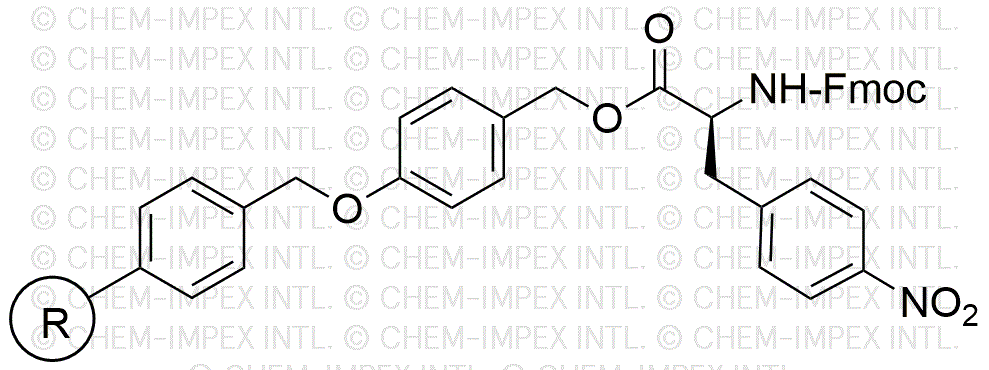Fmoc-4-nitro-L-phenylalanine 4-alkoxybenzyl alcohol resin is widely utilized in research focused on:
- Peptide Synthesis: This resin is essential in solid-phase peptide synthesis, allowing researchers to create complex peptides efficiently. Its unique structure facilitates the attachment and release of peptides, making the synthesis process smoother.
- Drug Development: In pharmaceutical research, it serves as a building block for developing new drug candidates, particularly those targeting specific proteins or enzymes. This application is crucial for advancing therapeutic options.
- Bioconjugation: The resin can be used in bioconjugation techniques, where it helps in attaching biomolecules to surfaces or other molecules, enhancing the functionality of diagnostic tools and drug delivery systems.
- Research in Cancer Therapeutics: Its properties enable the design of targeted therapies that can selectively attack cancer cells, providing a pathway for developing more effective treatments with fewer side effects.
- Material Science: The resin's chemical properties make it suitable for creating novel materials with specific functionalities, which can be applied in various fields, including electronics and nanotechnology.
General Information
Properties
Safety and Regulations
Applications
Fmoc-4-nitro-L-phenylalanine 4-alkoxybenzyl alcohol resin is widely utilized in research focused on:
- Peptide Synthesis: This resin is essential in solid-phase peptide synthesis, allowing researchers to create complex peptides efficiently. Its unique structure facilitates the attachment and release of peptides, making the synthesis process smoother.
- Drug Development: In pharmaceutical research, it serves as a building block for developing new drug candidates, particularly those targeting specific proteins or enzymes. This application is crucial for advancing therapeutic options.
- Bioconjugation: The resin can be used in bioconjugation techniques, where it helps in attaching biomolecules to surfaces or other molecules, enhancing the functionality of diagnostic tools and drug delivery systems.
- Research in Cancer Therapeutics: Its properties enable the design of targeted therapies that can selectively attack cancer cells, providing a pathway for developing more effective treatments with fewer side effects.
- Material Science: The resin's chemical properties make it suitable for creating novel materials with specific functionalities, which can be applied in various fields, including electronics and nanotechnology.
Documents
Safety Data Sheets (SDS)
The SDS provides comprehensive safety information on handling, storage, and disposal of the product.
Product Specification (PS)
The PS provides a comprehensive breakdown of the product’s properties, including chemical composition, physical state, purity, and storage requirements. It also details acceptable quality ranges and the product's intended applications.
Certificates of Analysis (COA)
Search for Certificates of Analysis (COA) by entering the products Lot Number. Lot and Batch Numbers can be found on a product’s label following the words ‘Lot’ or ‘Batch’.
*Catalog Number
*Lot Number
Certificates Of Origin (COO)
This COO confirms the country where the product was manufactured, and also details the materials and components used in it and whether it is derived from natural, synthetic, or other specific sources. This certificate may be required for customs, trade, and regulatory compliance.
*Catalog Number
*Lot Number
Safety Data Sheets (SDS)
The SDS provides comprehensive safety information on handling, storage, and disposal of the product.
DownloadProduct Specification (PS)
The PS provides a comprehensive breakdown of the product’s properties, including chemical composition, physical state, purity, and storage requirements. It also details acceptable quality ranges and the product's intended applications.
DownloadCertificates of Analysis (COA)
Search for Certificates of Analysis (COA) by entering the products Lot Number. Lot and Batch Numbers can be found on a product’s label following the words ‘Lot’ or ‘Batch’.
*Catalog Number
*Lot Number
Certificates Of Origin (COO)
This COO confirms the country where the product was manufactured, and also details the materials and components used in it and whether it is derived from natural, synthetic, or other specific sources. This certificate may be required for customs, trade, and regulatory compliance.

